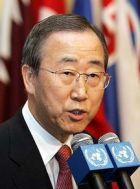New UN chief keeping focus on Darfur
Jan 4, 2007 (UNITED NATIONS) — Secretary-General Ban Ki-moon is keeping his promise to focus his “highest attention” on finding a peaceful solution to the three-year conflict in Sudan’s Darfur region which has killed more than 200,000 people and displaced 2.5 million.

On Wednesday, he met the new U.N. special envoy for Darfur, Jan Eliasson. On Thursday, he chaired what he called “a good meeting” with the newly formed Darfur Task Force comprising top U.N. officials. The U.N. said it was created to guide and streamline efforts to end the spiraling humanitarian and security crisis in the strife-torn region.
On Friday, Ban will meet with Eliasson, a former Swedish foreign minister and General Assembly president, and the African Union’s special envoy for Darfur, Salim Ahmed Salim, who was flying to New York to attend the session.
Ban told reporters on his first day of work on Tuesday that he would put “my highest attention” on Darfur. He announced that his first overseas trip will be to attend the African Union summit in Addis Ababa, Ethiopia, on Jan. 29-30, where he hopes to meet Sudan’s President Omar al-Bashir.
“By engaging myself in the diplomatic process, I hope that we will be able to resolve peacefully, as soon as possible, this very serious issue,” Ban said.
A May peace agreement signed by al-Bashir’s government and one of the major rebel groups was supposed to help end the conflict in Darfur. Instead, it has sparked months of fighting between rival rebel factions that has added to the toll of the dead and displaced.
Fighting in Darfur began in February 2003 when rebels from black African tribes took up arms, complaining of discrimination and oppression by Sudan’s Arab-dominated government. The government is accused of unleashing Arab tribal militia known as the Janjaweed against civilians in a campaign of murder, rape and arson – a charge the government denies.
The 7,000-strong poorly equipped and financed African Union force now in Darfur has been unable to bring security to the vast western region. In August the U.N. Security Council adopted a resolution that called for more than 20,000 U.N. peacekeepers to replace the overwhelmed AU force.
But al-Bashir rejected the resolution, claiming a U.N. force would compromise Sudan’s sovereignty and try to recolonize the country.
Annan then proposed a three-step U.N. package to beef up the African Union force, culminating with the deployment of a “hybrid” AU-U.N. force. He told al-Bashir every effort would be made to find African troops for a hybrid force of 17,300 military personnel and 5,300 police, but if that proved impossible the U.N. would use “a broader pool of troop contributing countries.”
Last month, al-Bashir sent a letter to Annan appearing to endorse the package. But days later, on Dec. 27, Sudan’s U.N. Ambassador Abdalmahmood Abdalhaleem told reporters that the hybrid force must be smaller and have no U.N. peacekeepers in traditional blue helmets, only African troops supported by U.N. technical and logistical experts.
In addition to resolving this latest dispute on the size and composition of the hybrid force, the United Nations also wants to try to revive peace talks with the rebel groups that refused to sign the May agreement.
Eliasson is expected to head to Sudan shortly to try to revive peace efforts.
(AP)
